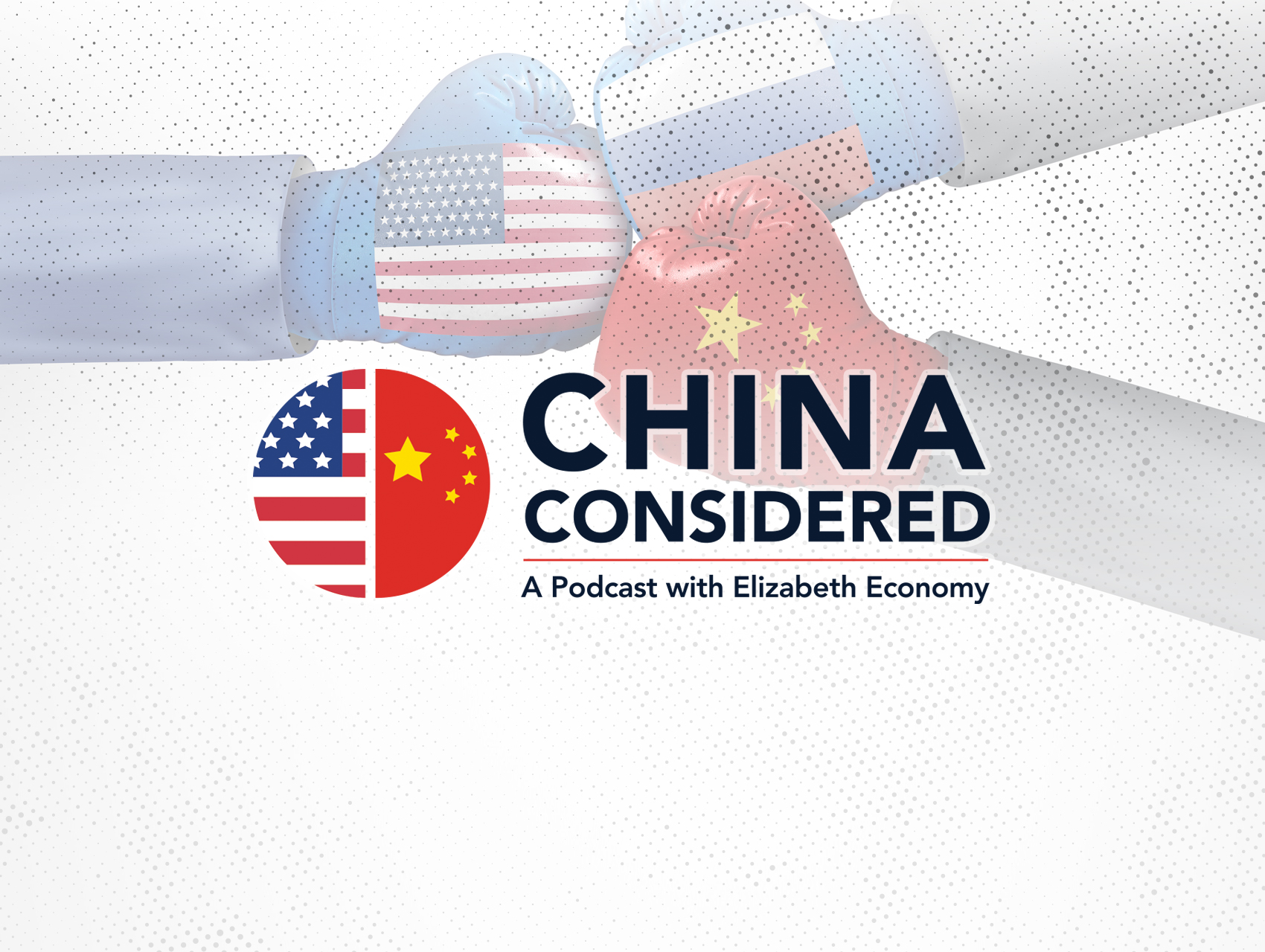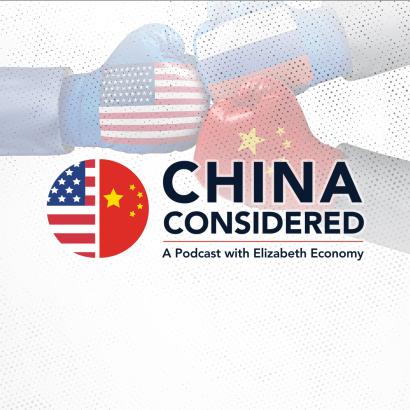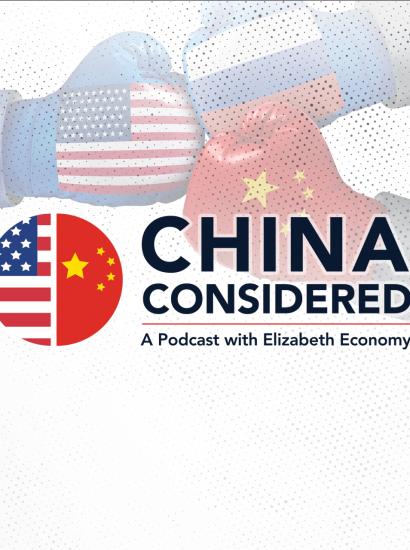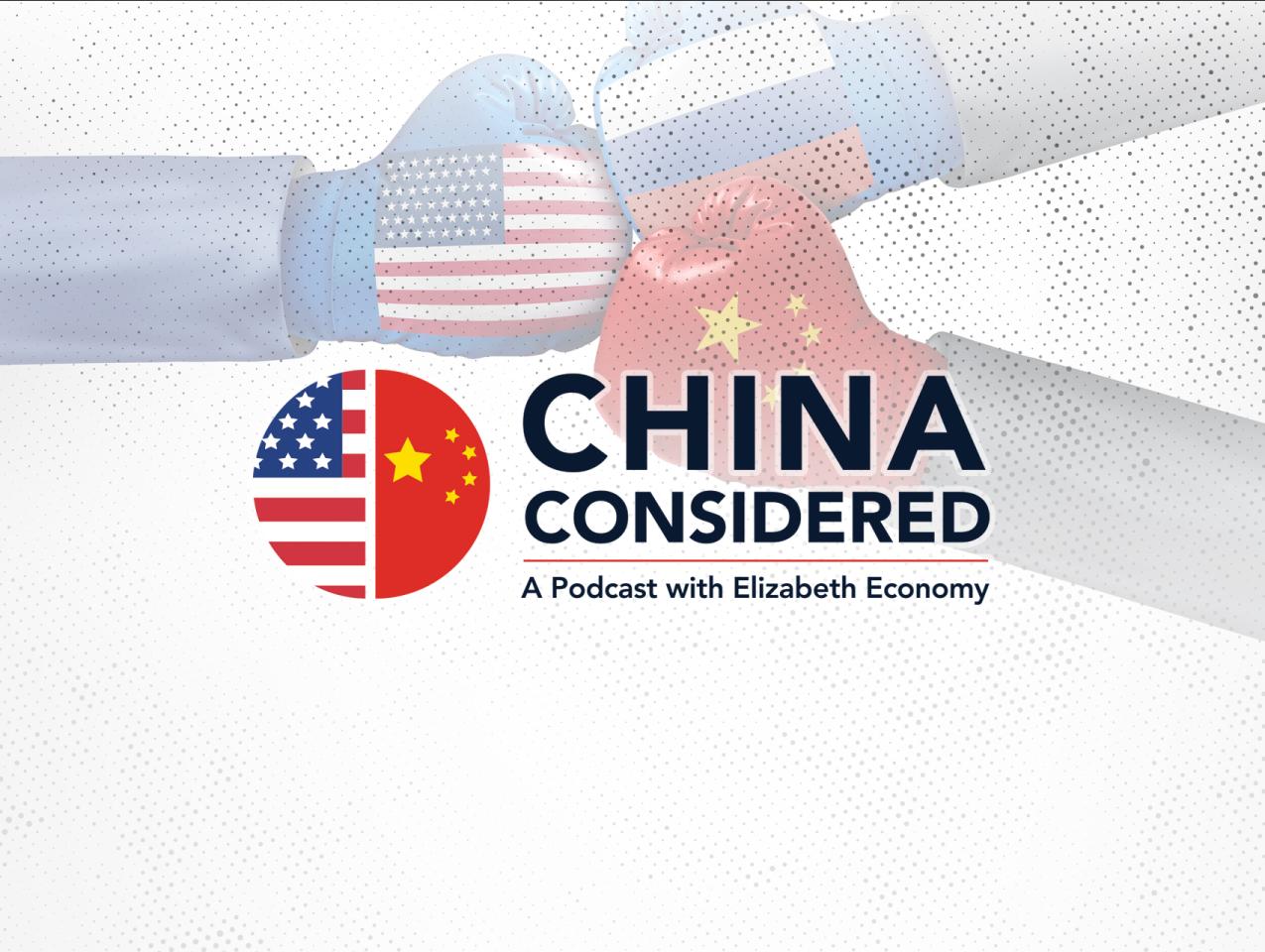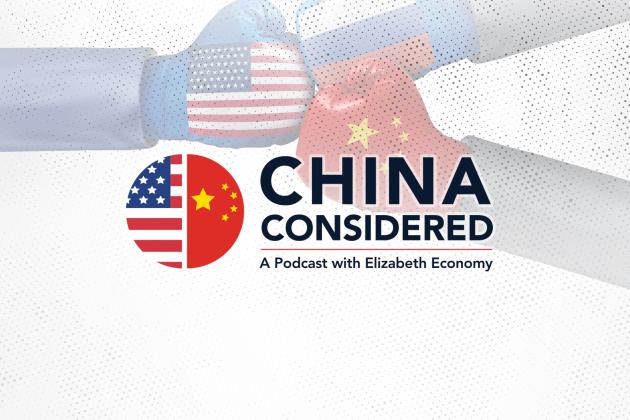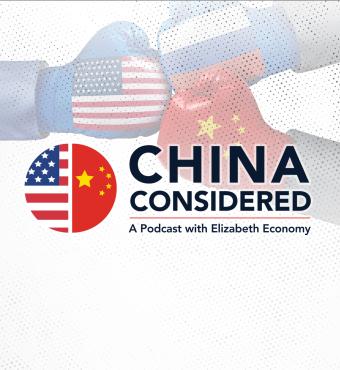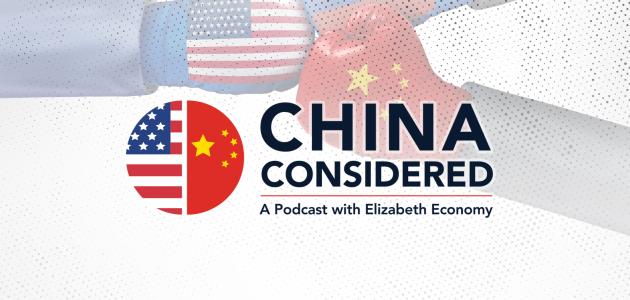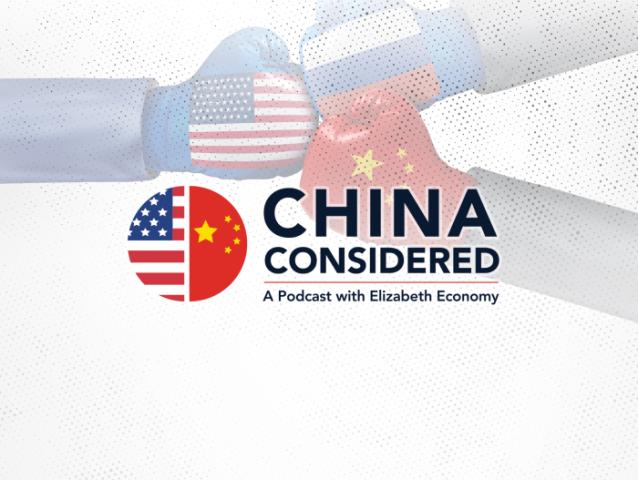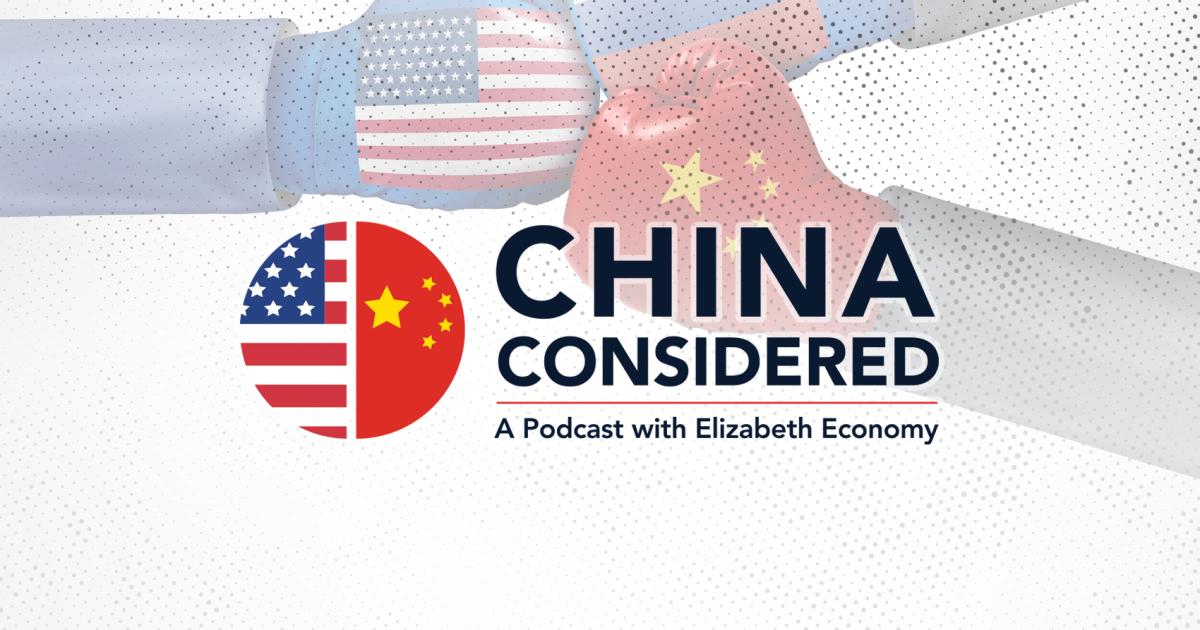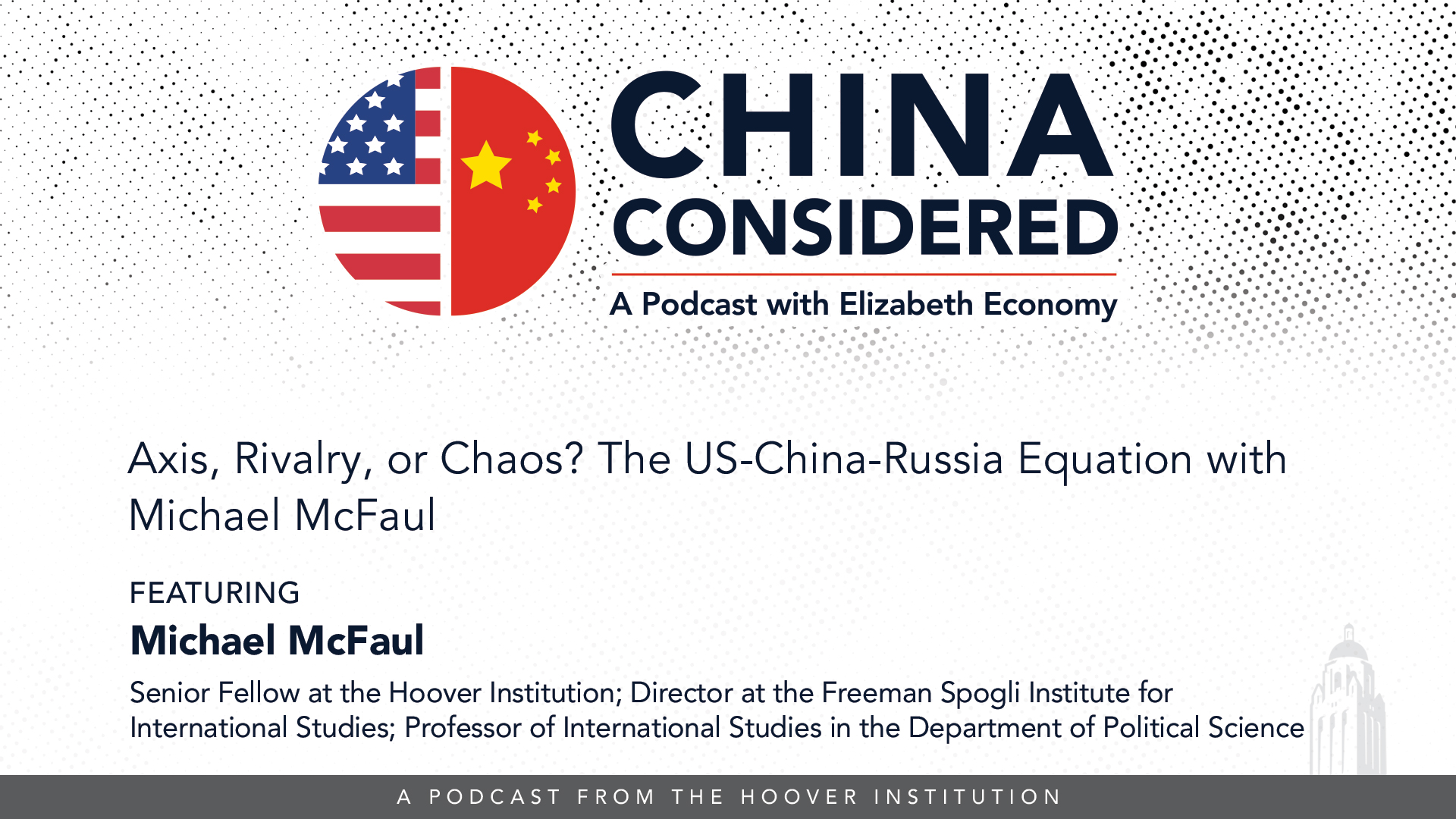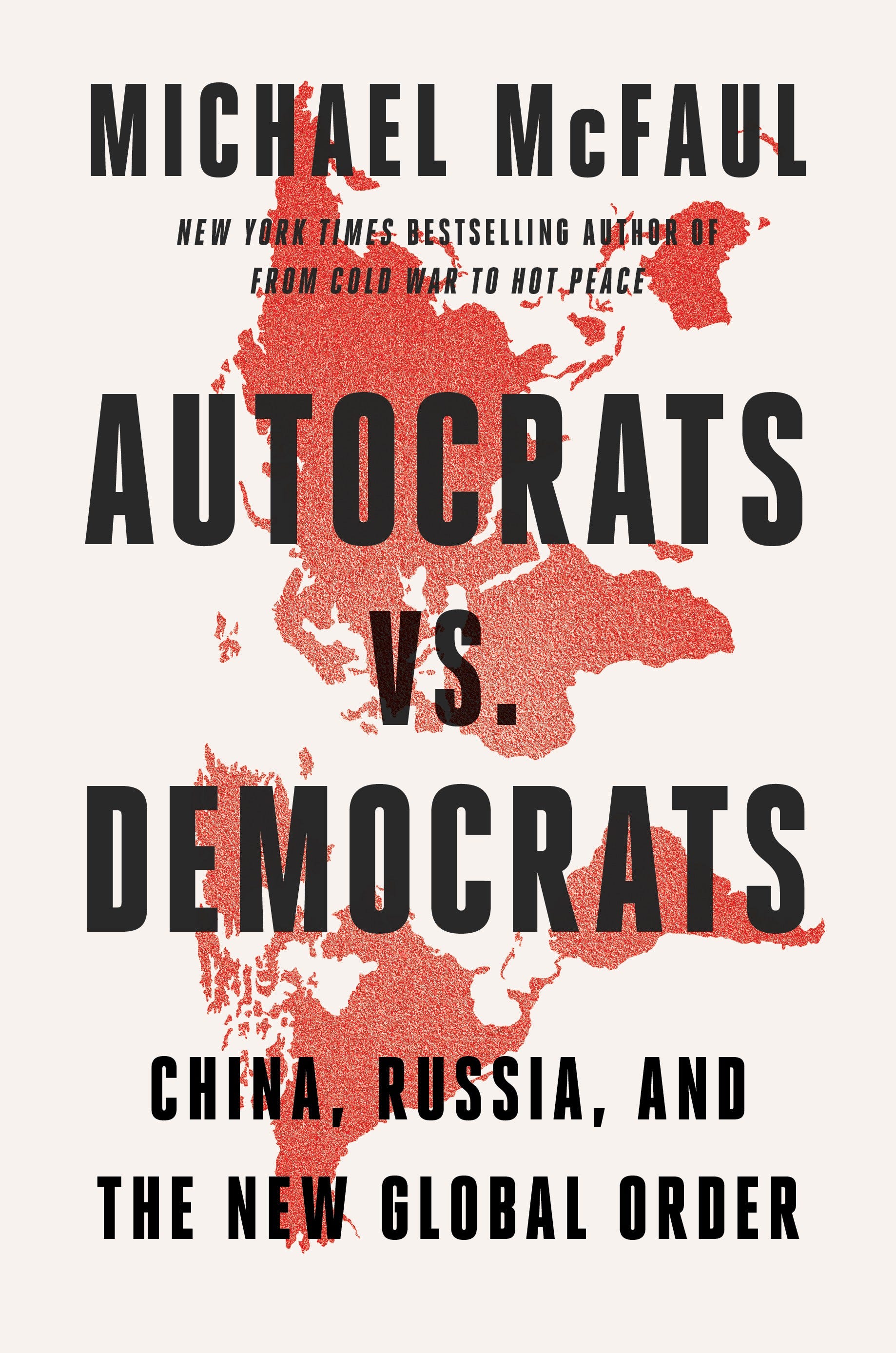- China
- Confronting and Competing with China
Dr. Elizabeth Economy and Michael McFaul sit down to discuss the relationship between the United States, China, and Russia, the history of US engagement with Russia, his experience as the United States Ambassador to Russia under President Barack Obama, and the increasing cooperation between China and Russia. McFaul begins by discussing early engagement with Russian President Dmitry Medvedev during the early Obama years, namely the signing of comprehensive multilateral sanctions with Iran, along with his role in crafting the Obama administration’s Russia policy. The two scholars then shift to a conversation about how Russia and China, namely Vladimir Putin and Xi Jinping, are attempting to reshape the international order, how the war in Ukraine has already changed this relationship, and whether a “reverse Kissinger” is possible from the perspective of the United States.
Disclaimer: At 03:08, the referenced chapter is Chapter 25, titled "Realistic Reengagement with the Soviets."
Recorded on June 3, 2025.
WATCH THE EPISODE
>> Elizabeth Economy: Welcome to China Considered, a podcast that brings fresh insight and informed discussion to one of the most consequential issues of our time, how China's changing and changing the world. I'm Liz Economy Hargrove, Senior Fellow and co-director of the program on the U.S., China, and the World at the Hoover Institution at Stanford University.
Today I'm excited to have as my guest my good friend and colleague Michael McFaul. Mike has many titles, professor, ambassador, and director of the Freeman Spogli Institute here at Stanford University. But above all, he is one of our country's topmost experts on all things Russia. And while many people say that the US-China relationship is the most important in the world, I would argue that certainly the relationship between Russia and China would be a very close second.
And that's going to be our main topic for today. But before we move on to the substance of Russia's relationship with China, I want to take a few minutes, Mike, to ask you about your time as the architect of the Obama administration's Russia policy and your service as ambassador to Russia.
So you're widely credited with being the architect of the Obama administration's Russia reset. What was that initiative?
>> Michael McFaul: Well, first, it's great to be here with you. Thanks for having me on. Second, I liked what you just said about what are the most important bilateral relationships, because, yes, U.S. china, of course, is, I think, the most important one, but Russia, China probably is second for sure.
So we'll talk about that in a bit on that ancient history, because I was in the government a long, long time ago, and whether I was the architect, I think that's probably overstated. But I did work on the Obama campaign. I worked three years at the White House before going to Moscow as the ambassador.
And the way I understood reset, which may not be the way everybody else understood it, because you've worked in the government, you know that the interagency process can be noisy. But I actually took the concept right out of a book by one of my mentors here at the Hoover Institution, George Schultz.
I knew George for a long time. I met him when I was a graduate student, and he gave me constant advice. He took me on trips from time to time. By the way, speaking of this topic, one of the panels he put me on in the early 1990s in Moscow was on a panel with Henry Kissinger and Lee Kuan Yew about the relationship between modernization and democracy.
And that was a very humbling experience for me. So George was he also gave me some words of encouragement after that. But in his memoir, which I don't think gets enough attention, by the way, maybe because it's 1200 pages long. So nobody wants to read a book that long.
Other people, including Henry, you know, rightfully get attention. But George, I think was an incredible diplomat. And in that memoir, and I think it's, I can even remember, I think it's chapter 29. It's called re Engaging the Soviets or something like that. And in that chapter, you know, the history, remember?
And I don't know, but you know, I hope most of your listeners don't remember. I hope they're younger than that. But you know, when the Reagan administration came in, they had no relationship with the Soviet Union, right? That was the evil empire. They had no contacts at all.
And Shultz comes in in 82. He doesn't join right away. And as Secretary of State, he looks at this and he says, this is crazy. We have to talk to these guys, these communists about certain things. Doesn't mean we have to check our values at the door. Doesn't mean we have to be friends and hold hands and sing Kumbaya.
But on certain matters like arms control and nuclear weapons and what they back then called regional conflicts, there were things to talk about. And he talks about the strategy for doing that. And that to me was kind of the metaphor for what we were trying to do with the Russians.
By the way, I think have some echoes for how one might think about dealing with the Chinese today. In that we had certain things that we wanted to achieve. We the United States of America, we the Obama administration. For instance, the New START treaty, the old START treaty was expiring in 2009.
That was the first year of the Obama administration. We did our interagency process and talked to the President. We said we, we think it'd be a good idea to have a follow on treaty and even reduce the number of nuclear weapons in the world. We can't do that without talking to the Russians, right?
You can't sign the treaty on your own. And so we decided, we wanted to do that. We decided in another, I would say the major priority for President Obama was to stop Iran from getting nuclear weapons. And we had a pressure track and an engagement track for that.
And the pressure track with sanctions that then led to a nuclear deal several years later with the Iranians. And you can't do that without the Russians. So UN Security Council Resolution 1929, I still remember it from 2010, the Russians signed that, that was the most comprehensive multilateral sanctions resolution against Iran ever.
And that's why we needed the reset, to get the Russians to do that. And I could go through the list. You know, we wanted to expand the war in Afghanistan. Whether that was good news or good policy or bad one, I'll let others join. Join that debate. But my job as the person dealing with Russia and Central Asia was to look for new transport routes to get to Iran that did not go through Pakistan, because we had planned to expand the war on terrorism to Pakistan, which we did rather dramatically in 2011 when we killed Osama bin Laden in Pakistan.
And when we came in, 90% of our supplies to Afghanistan went through Pakistan. By the time we did that military operation to kill Osama bin Laden, it was down to 50%. And that meant going through Russia. And I go into those details because these were what I consider American national interests, where the Russians could be useful.
I think our critics thought of it as better relations with Russia. And, you know, maybe other people thought that was the goal, but I never thought that was the goal, by the way, Liz, I never think that should be the goal with any country in the world. I've never understood, like, having a good meeting, that that's a means to an end, not an end in and of itself.
And so that was the kind of origins of the reset. And then to finish it, sorry for going on so long. You're making me nostalgic. It ended pretty dramatically when Vladimir Putin came back. And that's when I became the US Ambassador, by the way, just months before then.
And it was just clear as day to me that he wasn't interested in any of these what the Chinese would call win win outcomes, just had no interest whatsoever. And so, paradoxically, I was in the role of explaining from Moscow, because that's what embassies do, that the reset was over at a time when many people in Washington were like, what do you mean?
Like, we still have arms control to do. We still have other things we want to do. We still have business we want to do in Russia, you know. And when I was ambassador, that was the peak of investment and the peak of trade between the United States and Russia.
But our memos were saying, this is not going to last. And tragically, we were right. But I was the guy. I was the most vehement opponent of the reset. Which I am oftentimes described as being the author of.
>> Elizabeth Economy: So just so I'm clear, you were. Let's just, for the sake of argument, we'll still call you the architect of the reason.
Let's just say you were.
>> Michael McFaul: Happy to say that.
>> Elizabeth Economy: You played a major role in the creation and the design of it. So you were the proponent of it at the outset, but once you got to Moscow, you realized that there wasn't going to be sort of a new geostrategic partnership with Russia across a range of issues.
What triggered that sort of realization? And is that what had happened or did it happen even before you left for Moscow to become ambassador?
>> Michael McFaul: Yeah, yeah. Great question. So, two things. One, I never, ever use the word geostrategic partnership with Russia. I constantly cross those kinds of grandiose ambitions out.
I always just wanted to focus on national interests, and if we want to, do we need the Russians or not to achieve what's good for America? And a speech that I obviously helped to write that President Obama gave in 2009 in Moscow, it doesn't get enough attention, in my view, because Obama gave a lot of speeches and it was in the midst of many others.
It was right after his big speech in Cairo. But that speech is structured exactly that way. It's like, this is what we want to do. If you want to help us, that'll be great, but if you don't, this is what we're going to do anyway. But I also want to be.
I want to be candid. There were others in the Obama administration who talked in those terms. And I was literally like my friend, President Medvedev. Remember, there was a different president, right?
>> Elizabeth Economy: Yeah.
>> Michael McFaul: I would always cross out the word friend. There's no friends in diplomacy, but that was that, was, I want to be honest, that was a tension.
And, and it was with Medvedev. Medvedev has gone off the deep end now. He's an alcoholic. He says the most outrageous things. But I worked with the guy very closely for five years. He was different. His future, by the way, was way more tied to the reset than Barack Obama's.
This was his whole argument for trying to become president for a second term. And, you know, maybe tragically, he overreached in cooperating with us when he abstained on a UN Security Council resolution to authorize the use of force against Libya in 2011. Never in Russian or Soviet history had they ever authorized.
And by abstaining, he knew exactly what he was doing. Right. I was, I was actually in the meeting with him and Vice President Biden when he told us he was going to do it. And I'll tell you honestly, Liz, I was shocked. I did not believe it. He definitely had some buyer's remorse on that one.
But I tell you that story because that's where he was, the guy that we're doing all this stuff with. And before I got to Moscow, I got there In January of 2012, Putin announced that he was running for a third term in September of 2011. And that's when I knew all bets were off.
I remember briefing the president about it and I said, you know, we got a lot of things done, but this is over. Obama analytically agreed with me. We even talked about whether I should even go to MOSCOW as the U.S. ambassador, given, you know, there's not going to be much to do.
And we all decided that would be send the wrong signal and kind of, you know, appeasing Putin. We didn't want to do that. But no, it was that. I can tell you exact date, September 24, 2011. That's when I knew that our ability to cooperate with Russia on interests that advanced our security and economic interests radically reduced.
>> Elizabeth Economy: Now, I mean, I still remember, I think Medvedev really was at one point kind of the big hope for Russian reform and, you know, continued reform domestically and I think partnership with the United States dates. But, yeah, that all ended. Okay, so let's talk about your time as ambassador, because you certainly went far beyond simply thinking about geostrategic interests.
You really did, and I think partly as a result of all of your academic expertise as a Russia specialist, as a Soviet specialist, really did engage quite deeply with civil society in Russia as well. And you became known for reaching out, I think, to activists and to members of the sort of intelligentsia.
Can you talk a little bit about. So once you got to Russia and you were ambassador, first of all, what was a day in the life of Ambassador Mike McFaul like? Again, given now that you'd had this change in the administration, you were going to be dealing with Putin really front and center.
And you already knew that he wasn't interested in that same kind of partnership with the United States.
>> Michael McFaul: Well, so great questions. It's fun to talk about the past. So first, I want to go back to Schultz, because the idea of dual track diplomacy, engaging with the regime and society at the same time, that was a Reagan Schultz idea that I stole from his memoirs.
I want to be really brutally honest about it. And he writes about it very eloquently. And I said we should do the same thing. And I remember invoking Ronald Reagan in a White House meeting, saying we should be just like Reagan and you might think progressive Obama, these guys, Reagan.
And there were people like McFaul is some cold warrior but who really liked that idea? Barack Obama. He really liked the comparison to Reagan and especially when the Arab Spring started. We'll come back to that maybe later. But he liked that idea and ultimately blessed our strategy and we, unlike the current administration, we ran the interagency process very militantly, I would say in some ways too militantly.
But we ran the IPC process right at the Assistant Secretary level, then the Deputies Committee, the Principals Committee, and then we handed to the President a paper that was our strategy towards Russia, and he blessed it. And right in there was, we're going to do this stuff. And the first test of that was not when I was ambassador, but was when President Obama traveled to Moscow in 2009.
First big trip, by the way. We debated whether we're going to go to Russia or China first. And we had a big debate about that and we ended up going to Russia first.
>> Elizabeth Economy: Well, it's probably better because that China trip was no big success. That fell flat as a pancake.
But anyway, keep going.
>> Michael McFaul: Well, I should learn more from you on that because I remember I was in Singapore somewhere right before or after that trip, and I remembered it was the, the readout was not, was not a good one. Russia was a lot better, it did go better.
And I won't go through the details, but we did the meeting with Medvedev, we did the meeting in the Kremlin, he had his dinner with Medvedev, we had our four hour breakfast with Putin, and then we spent a whole day on this civil society engagement, right? So met with students, he gave a speech at a university, met with the business community, met with civil society in a parallel summit that we organized between our civil society and there.
And we even brought a friend of Barack Obama's from Chicago who was an activist with him in his civil society days. That was there. And then the last meeting of the trip, he met with the leaders of the opposition, the head of the Communist Party and the leading liberal at the time, a guy named Boris Nemtsov.
They were all there and that was our policy. Not everybody supported it. Liz, just so you know, that was very controversial. There were people that said, you know, and this was, you know, in terms of the architect, this stuff was all assigned to me. And, and I would say, usually in a pejorative way, it's like, why are we having these stupid meetings?
This is gonna piss them off and-
>> Elizabeth Economy: Sounds exciting to me. And I'll just say it reminds me very much of Clinton's trip to China when he met.
>> Michael McFaul: Long one right.
>> Elizabeth Economy: Activists and environmental activists. I know because I was brought in to help put together some of those meetings, even though I wasn't in the government at the time.
I thought it was terrific, that engagement with sort of civil society and the people of the country. But, sorry, keep going.
>> Michael McFaul: Well, so we did it. And I can tell you that at one point, the meeting with the business leaders was going on too long. You know how they can drone on those CEOs on both sides, by the way, Russians and Americans.
And Obama was falling asleep on the stage. White House staff is panicking, is like, well, the boss needs a nap. We gotta cancel the next meeting. And I went over to the, the civil society meeting with a guy, Dennis McDonough, who later became his chief of staff, and they said, we want to offer you, Dennis McDonough instead of Barack Obama to be the, the keynote and the faces.
>> Elizabeth Economy: I bet.
>> Michael McFaul: Dennis McDonough. Who the hell is he?
>> Elizabeth Economy: He's a smart guy, but he's not.
>> Michael McFaul: Yeah. Yeah. And that's when Dennis, to his credit, reversed that call and said, no, we got to get the president over here. And then the president, like, these are his people, like, he loves a civil society meeting.
And that was. We pulled it off, and it was not that controversial. We had some hiccups and things. But that's, that's in 2009. By the time I get there in 2012, two big things had changed. One, Putin is running for reelection, so he's in the presidential race. And two, there have been massive demonstrations against a falsified parliamentary election in 2011 that are still ongoing.
Hundreds of thousands of people led, by the way, by some of the people that had met with President Obama in 2009. So that's what I landed into. And one thing that you'll appreciate, because you've worked in the government that I think a lot of people don't appreciate, don't understand, that was our policy.
Every time Secretary Clinton, anybody went, they always did this kind of dual Track stuff. We had the, you know, these meetings at the ambassador's house, just like Ronald Reagan did, by the way, in May of 1988 in his very famous trip, you know, when he met with Gorbachev, but also the human rights activist.
That was just our. We just ran the play that way. Right. And became kind of routine. I traveled there with Bill Burns, and I remember we met with the civil society folks. It was just. That's the way we did it. But things had changed because of those two factors.
And I was the brand new ambassador and I get there and, you know, one of our, you know, this is part of work as embassies. We had a big fancy visitor coming, actually, Bill Burns, and he changed the schedule. He was in Iraq and he decided he wanted to come.
>> Elizabeth Economy: What was his role at that time?
>> Michael McFaul: He was Deputy Secretary of State.
>> Elizabeth Economy: Okay.
>> Michael McFaul: Or maybe under secretary. Number three. Number two. I'm forgetting now. I think he had been on promoter. Yeah, I think he was number two at the time. But, you know, in State Department world, you know, big important guy, former ambassador to Russia, and, you know, he can't, you know, so he came at that moment, literally my second day of work.
I had not even presented my credentials yet. We had to do a special side ceremony, and then I had the formal ceremony a few weeks later. And Bill was just running the play. In a way, it was great that he came then because he, you know, he knew a lot of these leaders, and so we went and met with them together for day one of the government.
But on day two, we had our meeting with civil society leaders, with opposition parliamentarians. Some key people, like Navalny, by the way, said no. And by the way, Alexei Navalny, who I knew well before I went to Moscow and knew after his daughter actually went to school here at Stanford.
Liz. I knew him and his wife, and I still know his wife and daughter. He never met with me ever when I was ambassador because he just didn't want the baggage of being labeled as a CIA agent. But we had these meetings. The meetings were for Secretary Burns.
I was accompanying him as the new US ambassador. But that's not the way the Russian press portrayed it. They portrayed it that Barack Obama has sent this specialist on democracy, specialists on color revolutions to foment revolution against Vladimir Putin and his regime. And that narrative got locked in the first week I was there, and it was basically the narrative for the entire time I was there.
>> Elizabeth Economy: So just give us quickly a sense, and then we'll move up to the present time and Talk a little bit about Putin's current strategy and what he's trying to accomplish, but just a little bit then, I mean, did you spend the next couple of years basically in isolation in the embassy because nobody would speak with you?
Or what was that like then to be ambassador when you had already, from the day one, basically had some kind of target painted on your back.
>> Michael McFaul: So thanks for asking that question because others did after me and you know, our ambassadors in China, you know how their lives have been.
And recently I was, we'll talk about that if we have time. But that was not the case in a rather paradoxical way in that because of my time working at the White House, I knew all the senior leaders in the Russian government well, and even people close to Putin.
Still, we had business to do. And even their intelligence, their head of tthe FSB, the successor organization to the CIA, in a weird- KGB. I'm just remembering.
>> Elizabeth Economy: You mean the parallel?
>> Michael McFaul: Well, I screwed that up. Thanks for catching me. I just remembered it because I do remember one very memorable time when the head of RCA, John Brennan @ the time met the head of their fsb.
And I was at that meeting. Those are some pretty wild meetings. And I tell you that because, you know, the big strategic, you know, there was not as many things to cooperate on, but there were some things like, like when, you know, these, these terrorists attacked our runners at the, in the Boston Marathon, we actually did quite a bit of cooperation between, you know, their, the equivalent fsb and their system is like the FBI plus the CIA.
They also have this SVR that's more like the CIA, but. But their FSB is a bigger thing than the FBI. But they cooperated with us. Right. And, and our FBI Director Mueller came when I was ambassador. So it wasn't isolation. There's actually quite a bit of interaction with the government.
But increasingly, they tried to constrain what I could do with civil society. So I used to give a lot of speeches at universities, and so they shut those down when I would travel to other cities. You know, they would try to limit the interaction that I could have with.
Non governmental folks. And so that became a bit of a cat and mouse game, but it, but it didn't. In fact, in my last week there, I met with a lot of senior government officials and it was all about laments about what could have been.
>> Elizabeth Economy: Yeah. And so, I mean, during these two years, you clearly had a very sort of upfront, close, personal view of Vladimir Putin.
>> Michael McFaul: Yes.
>> Elizabeth Economy: And you know, he has, of course, stayed in office since then, you know, help us understand what it is that he wants. I mean, you know, over the past decade or so or more now, I guess since you were there, just about a decade since you left, you know, Russia's sort of expansionist tendencies have obviously, you know, come into full view.
What does Putin want? What does he see as Russia's role on the global stage?
>> Michael McFaul: Yeah, well, I'll try to answer to the best of my abilities. And this is where we get into the Russia, China relationship for sure. I have observed Putin, we actually met in 1991, so we go way back.
I've written about him. I think at one time I counted on my CV I. The word Putin appears in over 65 articles and books that I've written. Say that somewhat embarrassingly cuz some people say I'm obsessed with them. I'm not obsessed with them, he's a prominent person in Russian politics.
You have to deal with him. And in the five years I was in the government, pretty much every phone call, I think almost, not almost. I think every meeting and phone call that the President had and other government officials had with Putin, I was there. I even flew to Los Cabos, Mexico, for a G20 meeting, for a meeting with Putin that President Obama asked me to come to.
That's very unusual in our diplomatic system and kind of pissed off some of the White House people, I can tell you that. That came along afterwards. But, but I, because, you know, I had a pretty good relationship with President Obama and he wanted me to be there to talk about your question.
Right. Especially in the pre. Brief and, and what I would say at 30,000ft. And then we can go into detail. A couple of things. First, Putin has changed over the years. I think it's a mistake a lot of analysts make that he's a KGB thug and he always has been.
He always was. And he is a KGB thug and he always has been. And he's never been a Democrat. That is true. But it is not true that he's always been anti Western and anti Capitalism. That was not true in those early years. I met him because he worked with the liberal, and I used the word liberal in the kind of European sense, pro market reformers around a very pro Western, pro European mayor at the time, Anatoly Sobchak, in the early 90s.
That's the team that he was with. He wasn't with the communists and the fascists back then. He was with them. And when he was first elected president, you know, he said we should join NATO. So this notion that NATO was that he's always been against NATO, that's completely not true.
He wanted to integrate with the west. And he said, why not? We're part of the liberalizing, Western oriented part of Europe too. And then September 11th happened, 2001. And I've heard him talk about that period when he first met with President Obama. He spoke very fondly of President George W.
Bush and how that created. We had a common enemy and we were fighting a global war on terrorism together. And he kind of signaled that if we could like get back to that, you know, things would be better in US Russian relations. That was in 2009. So I tell you that because I think the defining moments of his shift in the way he looked at the west was not NATO expansion, was not even the Iraq War.
I remember how he talked about the Iraq War with President Obama, by the way. He was against the Iraq war, they shared that view. It was actually what he calls what others have called the color revolutions. Serbia 2000, Georgia 2003, but especially the Orange Revolution in 2004. Well, I'll just say from my perspective, I've written a book about it, edited a book about it.
That was in 2004 that was a grassroots, peaceful, mass mobilization to force the government in power to. To recognize the legitimate results of a free and fair election. That's the way I perceive it. And President Yushenko eventually won because of that. Mass demonstrations in the courts. And that's the way I perceive it.
Actually. President Yushenko was just here recently. He visited Hoover and had him over for dinner. We were talking about it, about the different perceptions. From Putin's perception, that was a CIA orchestrated couple against his candidate, President at the time, Yanukovych, who later did become president six years later.
And from Putin's perspective, that's when he began to see us as the enemy that we support ideas of. You wouldn't use the language I would, but we support our people who have our ideological orientation. And that's when he said, okay, I got to get A better game to support my ideas and my ideological orientation in the world.
And I think we've been underestimating this ever since. Is Putin transactional? Yes. And I used to hear that a thousand times in government meetings. Putin's just transactional. Is he a thug? Yes. Who's one of the richest people in the world? Yes. Is he also an ideological leader? That is somebody shaped by his world, by the ideas of Putinism, or what I would call illiberal nationalism, I would add to that.
Yes, and he ever since saw the United States as his central enemy, seeking to weaken his autocratic regime at home and seeking to support their allies against his ideological allies in the world. By the way, I think Putin, until President Trump, his first election, and especially now in this uncertain time, Putin's partially right.
I think we need to admit that. Did the National Endowment for democracy support NGOs and independent media in 2004 that helped that mass mobilization? The answer to that is yes. Did the U.S. agency for International Development support those kinds of groups in the 2004 Orange Revolution? The answer to that is yes.
I know because I was actually hired by USAID to do an evaluation of their assistance programs leading up to the Orange Revolution. Now, do we foment revolution and over. That's a different matter. You know, that, I think, is that's where we get in the argument about perception. But supporting groups that monitor elections, as we did in Russia in the run up to 2011, in fact, we expanded the budgets of those NGOs.
I know, because I was part of those deliberations, we see that as supporting free and fair elections. Putin sees it as a strategy of regime change. And ever since 2004, he's just been locked in on it. And I remember very, yeah.
>> Elizabeth Economy: Let me just, just for a second, though, I want to take you back to what you said earlier, though, which was that, you know, he was a capitalist, he wanted to join NATO.
So both those things are true. But was there ever a sort of a liberal democratic bone in his body or what?
>> Michael McFaul: You clarified that, Liz. Markets, yes. Being part of the Western multilateral, you know, liberal international order, if there's such a thing left anymore. But joining the G7, G8, joining the WTO, I, part of those negotiations that was always there.
Never. And I'm glad you made the distinction. Never did he believe in democracy or those ideas. He just, he just, and then he, he made that very clear in 2000 when he started to shut down any checks on the power of the president. And that's when I wrote my first anti Putin piece was in March of 2000, saying in the Washington Post saying this guy is going to destroy democracy.
>> Elizabeth Economy: And no doubt he remembered that piece.
>> Michael McFaul: He most certainly did. He does his homework about people, I can tell you that when he meets with them and people like me.
>> Elizabeth Economy: Okay, but to the point now of how he sees Russia's role on the global stage and maybe in relationship to China, what do you see today in terms of from the Chinese perspective?
Of course, there's a lot of discussion about never calling and Xi Jinping is always very careful never to call Russia. Junior partner.
>> Michael McFaul: Yes.
>> Elizabeth Economy: Analysts in China, you know, are, are not quite so polite and you definitely have the sense that there are scholars in Chinese, scholars who clearly see Russia as the junior partner to China.
Some of them, in fact, think, you know, they should be more closely aligned with the west and not with Russia. So there's a lot of debate in the Chinese space on this. But, but how does Putin see it?
>> Michael McFaul: So, so Putin, once he decided we're the main enemy and he's going to fight us wherever we can.
He thinks in ideological terms and autocrats versus democrats. And in that world, China and Xi Jinping is his most important strategic partner and China is his most important strategic country in the world, without question. There's just no question in his mind that, that that's the way he sees China and he wants China to join him in this fight against liberal internationalism, democracy, you know, all these things that we were just talking about before.
And you know, I'm not the, I'm not an expert on China, but I most certainly have tried to learn about China and I've met.
>> Elizabeth Economy: a lot of. Time going there recently.
>> Michael McFaul: Well, I was just there a couple weeks ago meeting with some of those scholars you're just describing, right?
And there's a lot of churn among experts about whether this, you know, this relationship is good for us or not. And, you know, this guy's kind of crazy. You know, he's kind of gone off the deep end here. They kept. In my meetings in, in Beijing recently, Liz, because I don't speak Chinese.
I was meeting with the Russia, a lot of Russia specialists who speak Russian, and they kept using a word in Russian that's, that's very familiar in Russian, but it kind of sounds weird in English. Hooligan.
>> Elizabeth Economy: Yes.
>> Michael McFaul: hooligan.
>> Elizabeth Economy: Yeah, I remember that from my time, yes, in the Soviet Union.
>> Michael McFaul: My gun off, what is he doing? Yeah, but you didn't ask me that question. You asked me the question about Putin. So Putin wants the illiberal International to all get together to fight the, the, you know, the democratic world. And he thinks that that's what he's doing throughout, you know, well, before he invaded Ukraine a second time, right, he, he, he first invaded Ukraine to do that, to punish them for the, what they call the revolution of dignity, what he calls a CIA coup in 2014.
But then he went in heavily to support Assad, you know, and that, that worked for a long time, not forever, thankfully, but, you know, he deployed his air force to help Iran and Hezbollah and Assad maintain autocracy there. He's provided same kind of assistance to Venezuela and North Korea and Iran, and in some ways help him.
And so that's the role that he wants Xi Jinping to play. And he sees, he and Xi Jinping as the great leaders of this alliance. Not everybody in Russia shares that view. In the same way that we should be careful, you know, to disaggregate different views in China in a time of.
Well, let me back up first of all, before Putin invaded Ukraine the first time, when I, you know, I was there the day I left the. Moscow. The day he invaded Ukraine the first time, 2014. And that was planned, you know, months ago. But it just so that happened at the same time.
And, and what I. The buildup was happening and, you know, we. Lots of debates about it, and, and in Russia at that time, there were not just human rights activists, which, you know, there were those people as well, but there were big business people that, that had made their bet with the west, not with Xi Jinping in the east, and they wanted to make money in Europe and the United States.
You know, while I was ambassador, we were working on helping to create what would have been the largest joint venture in the history of capitalism, which was between Rosneft, their state owned company, and ExxonMobil. $500 billion. That's what they were talking about. And I want to be clear, we were supporting that.
The Obama administration thought that that was going to be good for stabilizing our relationship. And we always had this argument which turned out to be flawed. And I remember it very vividly because there was always, I used to sit across the hallway from our China folks at the White House and Obama was saying, we need to have Putin and Russia to have more to lose the next time they think about invading, because they just invaded Georgia in 2008.
They need to have more to lose the next time they think about invading. That was part of our strategy. And they always talked about China has a lot to lose when they think about using military force. The Russians don't. But I tell you that story because there were a lot of Russian entrepreneurs and their supporters in the business world that thought that war was a giant mistake.
And they also thought the bigger invasion in 2022 was a giant mistake in part because it meant that all their options for dealing with our companies closed and now they're forced. And I won't name names because these were all private conversations. But if you're in like the telecommunications world, you want options.
You don't just want to have to buy everything from China. Now those companies, they just have to buy from China. If you're in this, you know, I want to, I better be careful. I don't want to the company.
>> Elizabeth Economy: No, I don't want you to get in trouble.
And I don't want the companies in trouble either.
>> Michael McFaul: Yeah, yeah, but the companies are just, they're too small in Russia. But, but, but just, just speaking more generically, right, like if you're building a, a search engine company, I can talk about that one. Yandex. You want your investors to be Western investors.
You don't want to be relying on the Chinese and you don't want your investor to be Chinese. You want to be, and you, you think of your expansion of your business. China's cut off from you if you're Yandex. But, but Turkey's not. And, and, and all of the, the developing world is not.
You want to compete with Google in that space. And by invading and being cut off, I mean, Yandex then had to divide up, and their head of the company now lives in Israel. Right. He's starting his own company. So I just want to remind people that that debate, I presume I can't go to Russia.
I'm sanctioned there. But those kinds of people, they don't like the idea that their only partners in the world and their only markets in the world are Russia. And that junior partner thing that you talked about, there's a big debate about that. And Russia is like, okay, we're gonna sell them natural resources and we're gonna buy their cars.
That feels a little imperial to them. That feels like, okay, we're now in that world. And that is an uneasy world, not for Putin, but for Russian economic elites.
>> Elizabeth Economy: But clearly they're not having any influence on Putin. And, and to that it seems, and I know, because you wrote a very good piece in Foreign affairs with my good friend who was on this podcast before, Evan Medeiros, about the fact that the idea that the Trump administration had of splitting the reverse Kissinger or the reverse Nixon, about pulling Russia away from China really had no possibility of succeeding.
Is that right?
>> Michael McFaul: Yeah, yeah, of course. Because for Putin, Right. You know, tragically put, Russia today is a totalitarian dictatorship. I actually think it's, it's more authoritarian than the, the late Soviet era. I've written about that. But doesn't matter what these guys think, it doesn't matter what society thinks.
And you're going to buy Chinese cars whether you like it or not, because that's all that's available. And in Putin's view, you know, of course, he is courting Trump and he's trying to, you know, get concessions, and rather successfully so far that, that, that play may have run its course.
But, but of course he's doing that vis a vis Ukraine. But he has no intention of pivoting against Xi Jinping for, for a variety of reasons. First of all, this ideological thing is real for Putin. And I think.
>> Elizabeth Economy: Right?
>> Michael McFaul: Well, yes, you've written about that. I just think people, if you, if you don't study people, countries, and you just treat them as like unitary actors in a, in a theoretical world, then it's hard to understand that.
But, but, but if you do look at individuals and their worldview and you sit in a room with them, you realize that they don't think like us. They don't act like rational actors. And this idea we're Just going to pivot to the west because it's in our economic interest.
That's not Putin. Number two, he also understands enough about the west to understand that, that, you know, President Trump may be there for three years, but he's not going to be there for 30 years. And the stability he has with the relationship with Xi Jinping and the Chinese Communist Party, there's just no comparison.
And number three, you know, what would we get out of a pivot like that? Like, like, okay, now they're on our side. What, what do we get from Putin? Like, you know, I just think that, and, and, you know, I don't, I don't know the history as well as you do about the actual Nixon goes to China, but I think one could even ask that question about back then, but most certainly now like this.
So what, what are they going to do to help us deal with China? You know, they're going to be on our side in some fight over Taiwan. No way. And even if they were, like, they're not doing so well in Ukraine, I don't think they're a great ally for us.
So I just don't think it's going to work. I actually think pulling the Chinese away for the Russians, I'm not an expert on that, but that seems like a much more interesting play. But that's probably a different podcast for a different guest.
>> Elizabeth Economy: Yeah. And I would say probably just about as likely as you think that Russia from, from China.
I think, you know, President Xi Jinping has said on any number of occasions now that Vladimir Putin is his best friend.
>> Michael McFaul: Best friend, yes.
>> Elizabeth Economy: In the international
>> Michael McFaul: He uses that phrase, yes.
>> Elizabeth Economy: And he doesn't speak like that. I mean, I think it's important to recognize that's not, you know, typical for him to say.
So I think he takes this relationship incredibly seriously, as I, I think you're saying Vladimir Putin does. So I think the ties that bind them are-
>> Michael McFaul: Besties forever, yeah.
>> Elizabeth Economy: Quite strong at this point. So let me just ask, you know, two more questions. You know, first, does this relationship between China and Russia change when the leaders change?
Like, to what extent do you think this is a structurally based relationship? Or is there the opportunity, you know, some radically different leader comes into Russia or even maybe to China, and you get, you get a real reset in this relationship?
>> Michael McFaul: Well, I'll let you answer the question on China, on Russia.
The answer to that is yes. And we don't have to think about it in a counterfactual terms because we've already seen it. And, you know, beginning with Gorbachev, but then When Yeltsin came in, Yeltsin said, I don't want to be part of that world. I want to be part of your world.
And he went all in to try to be part of the west and democracy and capitalism and joining our clubs. He saw Russia's long term national economic and security interest to the west, not to the East. And so it's already happened now. It wasn't as successful as he wanted.
And the people around him. And again, there are reasons why we didn't get that right. And in the book I just finished writing, I talk about lessons learned from the past and let's learn what we did wrong and in that moment. But it already happened. So if it already happened, it can happen again.
That's the first thing I would say. Is it likely to happen quickly after Putin? My answer to that is no. I do tragically think that 25 years of Putin in power has just destroyed those that thought that Russia's interests were in the West. They're there and they'll someday be revived.
And at the end of the day, when you ask Russians, after a second or third vodka, are you European or Asian? They say, we're European. Putin does not lose, by the way, this is an interesting thing. He wants to make the argument that they're not part of Europe.
In fact, I witnessed it one time when he was meeting with Vice President Biden where he looked right into, I remember it was jarring, where he looked at Putin and he said, excuse me, he looked at Biden and he said, you know, your problem is you guys look at us and you look at our skin.
And he, you know, he kind of went like this and he says, because we look like you, you think that we think like you, but. But we don't. We're different. That's his worldview.
>> Elizabeth Economy: Wow.
>> Michael McFaul: But that is not. There are a lot of Russians who don't think that way.
And especially when you think about, are we like the Chinese? Are we more like the Germans? They're have a kind of deeper kind of civilizational view on that, but they're not in power now. And the regime that he's put in place is, is deep. Like, it's structurally going to take a long time to unravel Putinism.
Not unlike how long it took to unravel Stalinism. So I don't see it changing in the short term, but in the long term, I am more optimistic. And it's really hard to understand what Russians think. The data is horrible. And we have some very clover social scientists trying to do various.
Polling and, you know, different kinds of methods to get at it. But there is something I think is true that I think most people who follow Russia agree with, which is that the older, less educated, more rural you are, and the poorer you are, the more likely you are to support Putin.
And conversely, the younger, more educated, more urban, richer you are, the more likely you are to be an opponent to Putin. Now, being an opponent doesn't mean you're going to go out and protest. The costs of that are too high. You know, people have literally, including one of my friends, Alexei Navalny, have been killed for trying to do that.
Right. So just because people aren't protesting, we shouldn't presume that we understand their preferences. But that means that Putin's lost the future. Right. Those people are the ones most skeptical. But for them to have impact on the regime, I think it's going to take a long, long time.
>> Elizabeth Economy: Yeah, so last question. If you were advising, given everything that you've just said, if you were advising President Trump today, and assuming that he was listening. What would be the sort of single most important thing you think he should be thinking about doing with regard to the US policy toward Russia and sort of the Russia-China, I don't call it an alliance, but partnership?
>> Michael McFaul: Well, I've never briefed President Trump. I doubt I ever will. But if I had that opportunity first, I'd frame it in his language. Trump talks a lot about strong leaders, right? Way back to 2015, cuz I just finished writing this book, that's when he first talked about Putin, he's a strong leader.
He likes strong leaders. I think he said similar things about Xi Jinping. He also frames the world, not autocrats and Democrats like I do, but in Winners and losers, right. He uses that language a lot. Winners, losers. So that's his frame. And I would say, Mr. President, I think you need to reevaluate who you think are winners and losers and strong and weak leaders in this relationship between Russia and Ukraine.
Look at just what happened over the weekend, Mr. President. Look at this audacious, fantastically successful operation that just blew up, if you believe the reports, and we have to verify them, I got it. But 41 strategic bombers of the Russian Air Force and not a single Russian intelligence officer or soldier was lost in that operation.
And, Liz, maybe, you know, and you can't tell us, maybe the United States has the ability to pull an operation off like that. Maybe the Chinese do. I don't know that, but they haven't done it before. And we know The Russians can't, Mr. President, because if they had that capability, they would have done it a long time ago.
So who's the winners and losers here? In the long run, think about siding more with the Ukrainians. And in the long run, if you think about our challenges, anything about great power, competition over decades, and I think that's the way one needs to think about it, I want those Ukrainian drone companies to be on our side.
I want that capability to be on our side. I want that innovation to be on our side. And by the way, they're Democrats. They want to be part of the democratic world, the free world, whereas Putin has no inclination to do that. His best friend is in Beijing.
His best friend is not in Washington. So I think it could, that would be my advice. And the other thing I would say to President Trump is I applaud him for trying to end this horrible war, by the way, this barbaric, horrible invasion of Ukraine. And even though I've gotten in trouble with some of my friends in the Biden administration, I even think it was right to establish a channel of communication through Rubio, Secretary Rubio, meeting with Foreign Minister Lavrov.
I wish that channel was the channel and not these other ones. But if you wanna negotiate, you gotta talk to the enemy. Again, invoking George Shultz, that's what he said in 1982, you gotta do that. But the strategy of just giving Putin every concession he wants and pressuring Ukraine has not led to the end of the war.
And so now Trump's got to go to plan B. And the one thing I can tell you about Putin having dealt with them, when he gave all those concessions, Putin looked at that as weakness. He looked at this as a sign of weakness. You appease him, he looks at that as weakness.
And so what did he do? He upped the ante. He said he wanted more things. He said, well, now you got to recognize these four regions of Ukraine and Crimea as part of Russia in order for us to do the ceasefire. And I negotiated with these guys, including with Putin.
That's very consistent with them. And so if Trump wants to change the narrative about looking weak and he wants to create permissive conditions for an actual end of this war, he should increase the sanctions. There's already a bill. His buddy Lindsey Graham drafted it. He could just say, I support it.
It would sail through the U.S. congress. And then he should, I don't know, it's a bridge too far to say Trump. Another military assistance package for Ukraine. I don't see him doing that. But why not take those Russian central bank assets we have frozen in the United States and give those to the Ukrainians so that they could buy our weapons?
And then why not allow them to leverage the mineral deal that President Trump and President Zelensky just did recently to allow them to buy more weapons from us? What they really need is they need interceptors to replenish those patriot systems they supplied. And I think doing that would signal to Putin that he's not abandoning Ukraine and might finally create the permissive conditions for him to get serious about negotiating.
>> Elizabeth Economy: Great ideas. And I think that last point also fits within President Trump's desire to do business, to make everything a transaction and a deal. Right? Yeah. And yeah, so all good advice, maybe someone from the administration will take it up.
>> Michael McFaul: Maybe they'll be listening to your podcast.
>> Elizabeth Economy: Yeah, that's it. That's it.
>> Michael McFaul: Right, that'll be our hope.
>> Elizabeth Economy: So, listen, I know you have a new book coming out. You've teased it a little bit. It's called Autocrats vs Democrats: China, Russia, America, and the New Global Disorder. I can scarcely think of anything that's more timely coming out at the end of October.
You want to give us the elevator pitch, the one line teaser for it? I know it's going to be great, but what do you want everybody to know about it?
>> Michael McFaul: Well, I want everybody to buy the book. That goes without saying. I don't care if you read the book, but I want you to buy the book.
>> Elizabeth Economy: I say the same thing.
>> Michael McFaul: But I just say two things. You know, one, this book came out of a debate that you're closer to than I am about whether we've entered a new Cold War or not that started back in the first Trump administration. And I actually have studied the Cold War, I wrote my PhD about the Cold War.
And I came into that debate to say it's an oversimplified debate, it's too black and white. So some say It's Cold War 2.0, and I say, no, here are the differences. And some say it has nothing to do with the Cold War. And I say, no, you're wrong about that, there are some similarities.
And so it's a complex book in that, in that sense, Liz, I learned a lot from you, by the way, in writing it, and maybe that will bring the book sales down.
>> Elizabeth Economy: The fact that you learned a lot from me.
>> Michael McFaul: No, no, that is a complex book.
It's a complex book.
>> Elizabeth Economy: I know what you mean.
>> Michael McFaul: And you know, on these debates about do leaders matter? You know, I learned that all from you on China.
>> Elizabeth Economy: No, no, no, we started from the same perspective, but go ahead.
>> Michael McFaul: But I mean, there's the analytic piece about power regimes and, and I use that piece to explain great power relations, but then on this policy debate, I make things more complex to say.
And then there are some things have nothing to do with it. So there are lessons from the Cold War successes that we should replicate now. And by the way, Trump's not replicating any of those in that chapter. By the way, there's some mistakes we made in the Cold War.
We got to learn those, too, so that we don't repeat them. And tragically, I don't see that happening to the way they should. But then there's a whole bunch of things that you know better than I do for China and Russia, not just China, that have nothing to do with the Cold War.
And so we can't superimpose that metaphor to come up with policy prescriptions for that piece. And that, that piece, by the way, deals a lot with some of the good things that the Biden administration and you did to say we should continue those things. And there are things that have nothing to do with the Cold War.
That's what the book. So that's the analytic piece. But the real reason for. Right, the second, bigger important reason is I'm pretty nervous about where we are as a country in the world. I think we're making a lot of mistakes right now. And they're cell phone goals, we're doing them to ourselves.
We're pulling back, we're dismantling usaid, we're getting in fights with our allies, we're. Somebody's decided trade's no longer useful, that we don't wanna support democracy. And I actually think that all of those things I just described advance American national interests. And to throw the baby out with the bathwater.
Yes, we need to reform usaid. Yes, we need to reform our trading regime. But to think that we're gonna go back to some early late 19th century world and everything's gonna be great, I radically disagree with that. And I fear for my country if we try to go back to that in many of the ways that President Trump wants to.
So I wrote the book to try to explain why that's the wrong approach. And my book tour is going to be Alabama and Texas and Ohio and Montana and Idaho, in addition to other places, because I think those of us that believe this, we have to convince the American people of it.
I think we haven't done a good enough job of taking these ideas, even our elite universities, Liz, like, we gotta go to these places and explain why it was so smart during the Cold War to set up these research universities. They produce fantastic successes, and we need to replicate that, but we have to convince the American citizens to do it.
So I know it's a bit of a paradox to write a complex book for all Americans, but that was my objective, and that's what I hope to achieve.
>> Elizabeth Economy: I think it sounds terrific. And I never think we should underestimate the ability of Americans to understand complex, smart, analytical arguments.
>> Michael McFaul: 100%.
>> Elizabeth Economy: I think we do that to our detriment. So my guess is, Mike, that you have a second New York Times bestseller on your hands. And I'm really looking forward to reading it and to hearing you speak more about it. And I just want to thank you for a really rich conversation, especially for reminding us of the importance of, you know, looking back and understanding, you know, what we did well, what we didn't do so well, and what that means for how we should be thinking about the present time.
>> Michael McFaul: Fantastic conversation. Thanks for having me. I thought we would not have enough to say, but we had a lot to say, so I really appreciate that.
>> Elizabeth Economy: I never had that fear having been on a panel with you before. If you enjoyed this podcast and want to hear more recent discourse and debate on China, I encourage you to subscribe to China Considered via The Hoover Institution YouTube channel or podcast platform of your choice.
ABOUT THE SPEAKERS
Michael McFaul is Director at the Freeman Spogli Institute for International Studies, the Ken Olivier and Angela Nomellini Professor of International Studies in the Department of Political Science, and the Peter and Helen Bing Senior Fellow at the Hoover Institution. He joined the Stanford faculty in 1995. Dr. McFaul is also an International Affairs Analyst for NBC News and a columnist for The Washington Post. He served for five years in the Obama administration, first as Special Assistant to the President and Senior Director for Russian and Eurasian Affairs at the National Security Council at the White House (2009-2012), and then as U.S. Ambassador to the Russian Federation (2012-2014).
He has authored several books, most recently the New York Times bestseller From Cold War to Hot Peace: An American Ambassador in Putin’s Russia. He is currently writing a book called Autocrats versus Democrats: Lessons from the Cold War for Competing with China and Russia Today. He teaches courses on great power relations, democratization, comparative foreign policy decision-making, and revolutions.
Elizabeth Economy is the Hargrove Senior Fellow and co-director of the Program on the US, China, and the World at the Hoover Institution. From 2021-2023, she took leave from Hoover to serve as the senior advisor for China to the US Secretary of Commerce. Before joining Hoover, she was the C.V. Starr Senior Fellow and director, Asia Studies at the Council on Foreign Relations. She is the author of four books on China, including most recently The World According to China (Polity, 2021), and the co-editor of two volumes. She serves on the boards of the National Endowment for Democracy and the National Committee on US-China Relations. She is a member of the Aspen Strategy Group and Council on Foreign Relations and serves as a book reviewer for Foreign Affairs.
FOLLOW OUR GUEST ON SOCIAL MEDIA
- Follow Michael McFaul on LinkedIn (Michael McFaul) and on X (@McFaul)
ABOUT THE SERIES
China Considered with Elizabeth Economy is a Hoover Institution podcast series that features in-depth conversations with leading political figures, scholars, and activists from around the world. The series explores the ideas, events, and forces shaping China’s future and its global relationships, offering high-level expertise, clear-eyed analysis, and valuable insights to demystify China’s evolving dynamics and what they may mean for ordinary citizens and key decision makers across societies, governments, and the private sector.







